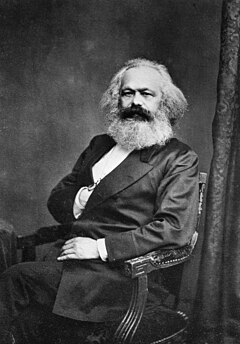 W
WKarl Heinrich Marx was a German philosopher, economist, historian, sociologist, political theorist, journalist and socialist revolutionary. Born in Trier, Germany, Marx studied law and philosophy at university. He married Jenny von Westphalen in 1843. Due to his political publications, Marx became stateless and lived in exile with his wife and children in London for decades, where he continued to develop his thought in collaboration with German thinker Friedrich Engels and publish his writings, researching in the British Museum Reading Room. His best-known titles are the 1848 pamphlet The Communist Manifesto and the three-volume Das Kapital (1867–1883). Marx's political and philosophical thought had enormous influence on subsequent intellectual, economic and political history. His name has been used as an adjective, a noun, and a school of social theory.
 W
WThe Bezirk Karl-Marx-Stadt, also known as Bezirk Chemnitz, was a district (Bezirk) of East Germany. The administrative seat and the main town was Karl-Marx-Stadt, renamed back to Chemnitz after the reunification of Germany.
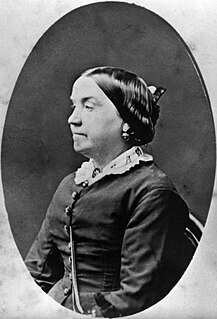 W
WLydia "Lizzie" Burns was a working-class Irish woman, best known as a long-term partner of Friedrich Engels.
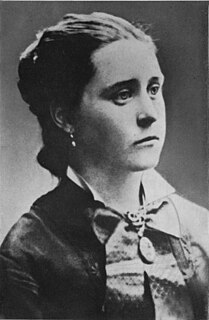 W
WMary Burns was a working-class Irish woman, best known as the lifelong partner of Friedrich Engels.
 W
WClassical Marxism refers to the economic, philosophical and sociological theories expounded by Karl Marx and Friedrich Engels as contrasted with later developments in Marxism, especially Marxism–Leninism.
 W
WNanette Salomons Cohen later on marriage, Nanette Pressburg, was a Dutch citizen known for being the maternal grandmother of Karl Marx, the socialist philosopher and economist.
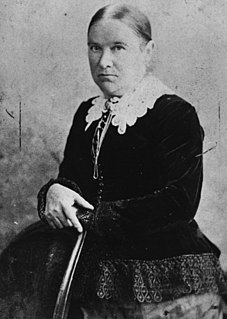 W
WHelene "Lenchen" Demuth was the housekeeper of Jenny and Karl Marx, later serving as the household manager and political confidante of Friedrich Engels.
 W
WFriedrich Engels, sometimes anglicised as Frederick Engels, was a German philosopher, economist, historian, political theorist and revolutionary socialist. He was also a businessman, journalist and political activist, whose father was an owner of large textile factories in Salford and Barmen, Prussia.
 W
WInfluences on Karl Marx are generally thought to have been derived from three sources, namely German idealist philosophy, French socialism and English and Scottish political economy.
 W
WLouise Juta, born Louise Marx was a bookseller and the sister of Karl Marx.
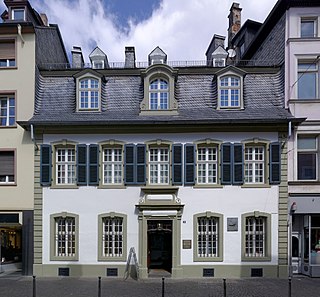 W
WThe Karl Marx House museum is a writer's house museum in Trier. In 1818, Karl Marx, the father of Marxism, which influenced both modern socialism and communism, was born in the house. It is now a museum about Karl Marx's life and writings as well as the history of communism.
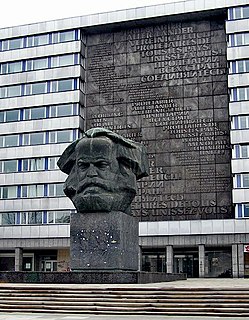 W
WThe Karl Marx Monument is a 7.10m (23.29ft)-tall stylized head of Karl Marx in Chemnitz, Germany. The heavy-duty sculpture, together with the base platform, stand over 13 meters tall and weighs approximately 40 tonnes. On a wall just behind the monument, the phrase "Workers of the world, unite!" is inscripted in four languages: German, English, French and Russian.
 W
WKarl Marx Year was a series of anniversaries of Karl Marx commemorated by East Germany in 1953, 1968, and 1983. The most prominent was in 1953, for the 70th anniversary of Marx's death, and included the renaming of Chemnitz as Karl-Marx Stadt and of Leipzig University as Karl Marx University, the founding of the Order of Karl Marx, and the initiation of the Marx-Engels-Werke project of Marx and Engels' works. The 1968 commemoration marked the 150th anniversary of his birth, and 1983 the 100th anniversary of his death.
 W
WKarl-Marx-Allee is a monumental socialist boulevard built by the GDR between 1952 and 1960 in Berlin Friedrichshain and Mitte. Today the boulevard is named after Karl Marx. It should not be confused with the Karl-Marx-Straße in the Neukölln district of Berlin.
 W
WThe Ligue internationale de la paix was created after a public opinion campaign against a war between the Second French Empire and the Kingdom of Prussia over Luxembourg. The Luxembourg crisis was peacefully resolved in 1867 by the Treaty of London but in 1870 the Franco-Prussian War could not be prevented so the league dissolved and refounded as the 'Société française pour l'arbitrage entre nations' in the same year.
 W
WJenny Caroline "Jennychen" Marx Longuet was the eldest daughter of Jenny von Westphalen Marx and Karl Marx. Briefly a political journalist writing under the pen name "J. Williams", Longuet taught language classes and had a family of five sons and a daughter before her own death due to cancer at the age of 38.
 W
WMarx-Engels-Forum is a public park in the central Mitte district of Berlin, the capital of Germany. It is named for Karl Marx and Friedrich Engels, authors of The Communist Manifesto of 1848 and regarded as two of the most influential people in the socialist movement. The park was created by the authorities of the former German Democratic Republic (GDR) in 1986.
 W
WJenny Julia Eleanor Marx, sometimes called Eleanor Aveling and known to her family as Tussy, was the English-born youngest daughter of Karl Marx. She was herself a socialist activist who sometimes worked as a literary translator. In March 1898, after discovering that Edward Aveling, her partner and a prominent British Marxist, had secretly married a young actress in June of the previous year, she poisoned herself at the age of 43.
 W
WJenny Laura Marx, better known as Laura Marx, was the second daughter of Karl Marx and Jenny von Westphalen. In 1868, she married Paul Lafargue. The two committed suicide together in 1911.
 W
WMarxism is a method of socioeconomic analysis that uses a materialist interpretation of historical development, better known as historical materialism, to understand class relations and social conflict as well as a dialectical perspective to view social transformation. It originates from the works of 19th-century German philosophers Karl Marx and Friedrich Engels. As Marxism has developed over time into various branches and schools of thought, there is currently no single definitive Marxist theory.
 W
WThe opium of the people is a dictum used in reference to religion, derived from the most frequently paraphrased statements of German sociologist and economic theorist Karl Marx: "Religion is the opium of the people." In context, the statement is part of Marx's structural-functionalist argument that religion was constructed by people to calm uncertainty over their role in the universe and in society.
 W
WThe Order of Karl Marx was the most important order in the German Democratic Republic (GDR). The award of the order also included a prize of 20,000 East German marks.
 W
WLion Philips was a Dutch tobacco merchant. He is the grandfather of Gerard and Anton Philips of Philips Electronics, and was an important financial supporter of Karl Marx.
 W
WThe Tomb of Karl Marx stands in the Eastern cemetery of Highgate Cemetery, North London, England. It commemorates the burial sites of Marx, of his wife, Jenny von Westphalen, and other members of his family. Originally buried in a different part of the Eastern cemetery, the bodies were disinterred and reburied at their present location in 1954. The tomb was designed by Laurence Bradshaw and was unveiled in 1956, in a ceremony led by Harry Pollitt, the General Secretary of the Communist Party of Great Britain, which funded the memorial. The tomb consists of a large bust of Marx in bronze set on a marble pedestal. The pedestal is inscribed with quotes from Marx's works including, on the front, the final words of The Communist Manifesto, "Workers of all lands unite". Since its construction, the tomb has become a place of pilgrimage for followers of Marxist theory. It has also been a target for Marx's opponents, suffering vandalism, and two bomb attacks in the 1970s. It is a Grade I listed structure, the highest listing reserved for buildings and structures of "exceptional interest".
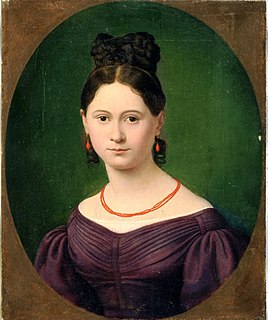 W
WJohanna Bertha Julie Jenny Edle von Westphalen was a German theatre critic and political activist. She was married to the philosopher and political theorist Karl Marx.
 W
WThe correct place of Karl Marx's early writings within his system as a whole has been a matter of great controversy. Some believe there is a break in Marx's development that divides his thought into two periods: the "Young Marx" is said to be a thinker who deals with the problem of alienation, while the "Mature Marx" is said to aspire to a scientific socialism.